What if we told you that doing resistance exercise for just 15 minutes, two or three times a week, would transform your body and mind?
Enter HIRT – or high-intensity resistance training.
You might already be familiar with its cousin, HIIT (high-intensity interval training), but HIRT is the current buzzword in fitness circles. So, what exactly is it and how does it differ?
The interval concept is the same – repeating a set of exercises on a loop with a period of work, followed by a short period of rest.
The overall time is usually between 12 and 20 minutes, so it’s the perfect choice if you’re short on time.
The weights used are light (1kg-3kg), so you can do a high number of reps within the time given. Because the weights are light and the reps are high, it results in lean muscle without bulk.

HIRT is perfect for those pressed for time.
(Credit: Getty)Why choose HIRT?
“Because you’re focusing on muscle, you’ll burn fat and develop lean muscle faster,” says Tiffiny Hall, a top Australian personal trainer and specialist in HIRT.
But isn’t cardio important, we hear you ask? That’s the joy of HIRT – because the reps are high and the intensity is high, your heart rate will rise and you’ll be out of breath, so it gives you a great cardiovascular workout.
“You get the best of both worlds,” says Tiffiny. “HIRT is more effective at building lean muscle mass than HIIT, but you don’t miss out on the cardio.”
And why do it this way rather than a longer weights session at the gym?
Well, there’s the time issue for a start – 15 minutes of exercise at home with little equipment is easier to fit into your day than an hour at the gym.
WATCH: Elyse Knowles shows off her exercise routine. Story continues…
It’s also a more effective way of exercising when it comes to resting energy expenditure (REE) – or how many calories you burn after you’ve finished exercising.
A small study in the Journal of Translational Medicine found that HIRT had a significantly higher REE after 22 hours than traditional resistance training, and that it boosted muscle mass as well as strength and metabolism.
It is an intense form of exercise, but anyone can do it.
“You can start with a shorter period of work (for example, in one minute, you could do 20 seconds of work, and rest for the remainder of the minute) and a lower number of sets, and build up as you get fitter,” says Tiffiny.

HIRT stands for high intensity resistance training.
(Credit: Getty)A more confident you
The benefits of becoming so fit and strong will seep into other areas of your life too.
“It complements any other exercise you do, but it will also give your confidence a huge boost,” says Tiffiny.
“HIRT involves challenging and pushing yourself – having conquered that, you’ll find that you feel able to push and challenge yourself in other areas of your life, such as work.
“If you get up and get your workout done in the morning, your energy levels will go sky-high for the rest of the day. You’ll have better stamina and endurance for daily life and you’ll also find yourself leaning towards better food choices during the post-exercise high.”
The fitter, more sculpted physique that comes with HIRT also has huge health benefits, especially for women.
“After 35, we start to lose muscle mass, and this is especially the case for women as they approach or go through the menopause,” says Tiffiny.
“Doing HIRT on a regular basis will help to preserve lean muscle mass, which in turn, helps you maintain a healthy weight.”

Building lean muscle helps the body lose fat faster.
(Credit: Getty)Four step HIRT workout
Follow these four steps at home to experience HIRT for yourself.
Do a gentle warm-up and then do four rounds in succession of each of the exercises. Spend a minute on each one, which includes the exercise and the rest, then move on to the next. The whole workout will take 16 minutes. Aim to do as many of each within the time frame as you can.
Stretch thoroughly afterwards. When weights are required, use dumbbells if you have them, but cans of food or bottles of water will also work.
If you’re new to exercise or high-intensity training, start with two rounds at beginner level. Always stop if you feel pain or become dizzy or excessively breathless.
When you’ve finished a session, drink plenty of water and eat a protein-based snack to help rebuild the muscle.
Beginners: 20 seconds exercise, 40 seconds rest.
Intermediate: 30 seconds exercise, 30 seconds rest.
Advanced: 40 seconds exercise, 20 seconds rest.

Don’t have dumbbells at home? Use canned food or water bottles instead!
(Credit: Getty)Mountain climbers
From a plank position with arms straight, lift one foot off the ground and bring the knee in towards your chest, bringing it as close as you can.Place the foot back on the ground where it was at the start and repeat with the other leg. Do this in a flowing movement, keeping your core strong throughout.
Dumbbell straight punches
Stand with feet just wider than hip-width and engage your core-stability muscles. Holding a weight in each hand, punch your arms forward alternately. To make it harder, go into a squat position and punch up into the air above your head.
Press-ups
Start in a plank with arms straight beneath your shoulders and toes tucked under.
Bend your elbows to lower your body to the ground, engaging the muscles around your middle. Go as low as you can manage.
If you can’t do a full press-up (not many people can!), you can kneel on all fours and lower your face towards the ground by bending your elbows; you can stand and do press-ups against a wall or you can go into a full press-up position but with your knees on the floor.
Squats with resistance
Holding a weight in each hand, stand with feet just wider than hip-width apart. Keeping your chest up and facing forwards (imagine you’re looking in a mirror and continue to look into it as you squat), squat down as though you’re going to sit on a chair behind you. Return to standing and repeat.





